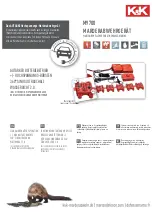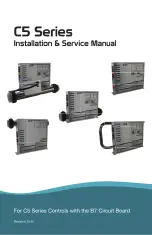
Getting Started
3
SLAU599A – August 2015 – Revised March 2017
Copyright © 2015–2017, Texas Instruments Incorporated
BOOSTXL-EDUMKII Educational BoosterPack™ Plug-in Module Mark II
1
Getting Started
1.1
Introduction
The BOOSTXL-EDUMKII BoosterPack plug-in module is an easy-to-use plug-in module that offers a high
level of integration for developers to quickly add to LaunchPad development kit designs. Various analog
and digital inputs and outputs are at your disposal including an analog joystick, environmental and motion
sensors, RGB LED, microphone, buzzer, color LCD display, and more.
This BoosterPack plug-in module was developed with Energia in mind. Energia is an open source,
community developed coding environment, which is supported by a robust framework of intuitive APIs and
easy-to-use software libraries for rapid firmware development. TI recommends Energia v12 or later. Learn
more about Energia at
.
1.2
Key Features
•
TI OPT3001 light sensor
•
TI TMP006 temperature sensor
•
Servo motor connector
•
3-axis accelerometer
•
RGB multicolor LED
•
Piezo buzzer
•
Color 128x128 TFT LCD display
•
Microphone
•
2-axis joystick with pushbutton
•
User push buttons
•
40-pin BoosterPack plug-in module standard for use with any LaunchPad development kit
1.3
What's Included
1.3.1
Kit Contents
•
1 x BOOSTXL-EDUMKII BoosterPack plug-in module
•
1 x Quick Start Guide
1.3.2
Software Examples
•
SimpleLink™
MSP-EXP432P401R LaunchPad development kit
+ BOOSTXL-EDUMKII demos (see
)
–
BOOSTXL-EDUMKII_Accelerometer_MSP432P401R
–
BOOSTXL-EDUMKII_JoyStick_MSP432P401R
–
BOOSTXL-EDUMKII_LightSensor_MSP432P401R
–
BOOSTXL-EDUMKII_Temperature_MSP432P401R
–
BOOSTXL-EDUMKII_MicrophoneFFT_MSP432P401R
1.4
Next Steps: Looking Into the Provided Code
After the EVM features have been explored, the fun can begin. It's time to open an integrated
development environment (IDE) and start looking at the code examples.
describes the example
projects available to make it easy to understand the provided software. For more information on where to
find and download an IDE, see
.




































